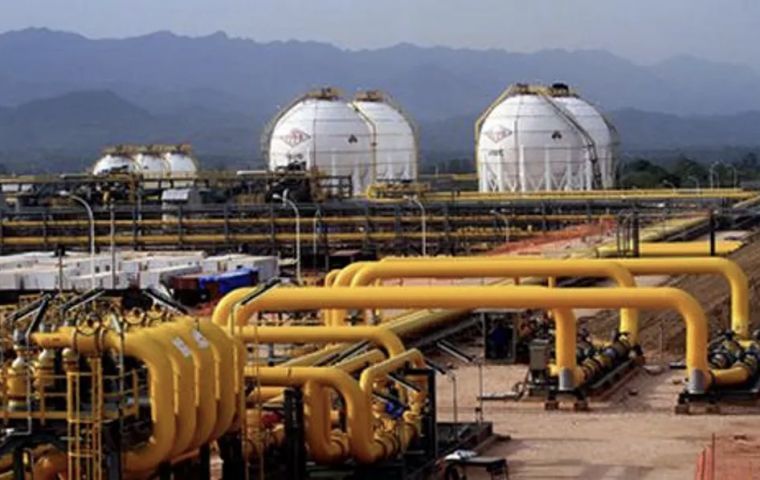MercoPress. South Atlantic News Agency
Bolivia wants better gas deal with Brazil
 Bolivia expects to receive an additional US$ 100 million from the new deal with Argentina
Bolivia expects to receive an additional US$ 100 million from the new deal with Argentina Bolivia's Minister of Hydrocarbons and Energy Franklin Molina said the agreement with Brazil for the sale of cooking gas signed during the arguably illegitimate administration of Janine Áñez was detrimental to his country and will now seek to reach a new, more favorable deal.
Molina made those remarks after Brazilian President Jair Bolsonaro decried Bolivia's decision to refunnel 30% of the gas originally bound for South America's largest country to Argentina, where President Alberto Fernández has a lot more in common with Bolivian leader Luis Arce Catacora and also to former President Evo Morales Ayma.
“Everything is orchestrated,” Bolsonaro complained, arguing that angered Brazilians who would have to pay higher gas bills would turn to “you know whom” (leftwing presidential candidate and former two-time head of state Luiz Inácio Lula Da Silva) and said his own country's state-run oil company Petrobras was behind the maneuver.
Molina said the price agreed in the addendum signed under Áñez was not favorable for Bolivia and was causing economic damage to the state-owned Yacimientos Petrolíferos Fiscales Bolivianos (YPFB).
”It is a duty to renegotiate the conditions of said addendum, because who signed it was a de facto government that did not care about the interests of the State (...) Bolivia is looking for a better price for its natural gas, better conditions and a better market,“ Molina said in a statement.
The March 2020 addendum sought to grant Bolivia an income of at least US$ 4 billion until 2026 for daily shipments of between 14 and 20 million cubic meters. Molina also explained that YPFB President Armin Dorgathen had been in Brazil seeking ”better conditions.“
”The response has not been what was expected, and in view of this situation, we have focused on the contract, where one of its clauses states that if one of the parties is not satisfied with the price, that party can seek renegotiation,“ said Molina.
The minister also pointed out there were private companies in Brazil willing to buy Bolivian gas at prices between 15 and 18 dollars per million BTU, while as per the Áñez agreement Brazil would pay between 6 and 7 dollars per million BTUs.
Molina also underlined it was another ”mistake“ to accept that YPFB should cover the costs of shipment to the delivery point, which was previously covered by Petrobras and which represented yearly losses of around US$ 70 million to the Bolivian state-owned company.
Natural gas has been Bolivia's main export product and the mainstay of the Bolivian economy in the last two decades, with its main markets Argentina and Brazil. In recent years there has been a decline in output and income generated by the sale of hydrocarbons due to price fluctuations in foreign markets.
Petrobras reported last week that the amount of gas from Bolivia was being cut down as of May. ”Such a 30% reduction was not foreseen and implies the need to import additional volumes of liquid natural gas to meet Petrobras' supply needs.”
Bolivia and Argentina signed a new agreement for the purchase and sale of natural gas in larger volumes and for which Bolivia expects to receive an additional US$ 100 million from Argentina.




Top Comments
Disclaimer & comment rulesCommenting for this story is now closed.
If you have a Facebook account, become a fan and comment on our Facebook Page!